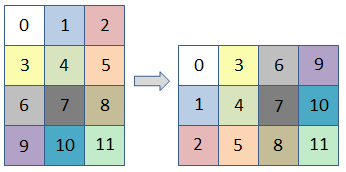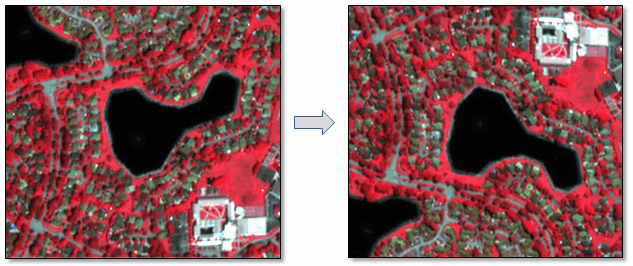This function constructs an ENVIRaster from a source raster where rows are interchanged with columns.


The result is a virtual raster, which has some additional considerations with regard to methods and properties. See Virtual Rasters for more information, including how they differ from ENVITasks.
The equivalent task is TransposeRaster.
Example
e = ENVI()
file = FILEPATH('qb_boulder_msi', ROOT_DIR=e.ROOT_DIR, $
SUBDIRECTORY = ['data'])
raster = e.OpenRaster(file)
transposeRaster = ENVITransposeRaster(raster)
View = e.GetView()
Layer = View.CreateLayer(transposeRaster)
Syntax
Result = ENVITransposeRaster(Input_Raster, ERROR=variable)
Return Value
This routine returns a reference to an ENVIRaster.
Arguments
Input_Raster
Specify the input ENVIRaster. If the input raster contains a spatial reference (including GLT), it will not be passed to the transpose raster.
Methods
This virtual raster inherits methods and properties from ENVIRaster; however the following methods will override the ENVIRaster methods:
Dehydrate
Hydrate
Keywords
ERROR (optional)
Set this keyword to a named variable that will contain any error message issued during execution of this routine. If no error occurs, the ERROR variable will be set to a null string (''). If an error occurs and the routine is a function, then the function result will be undefined.
When this keyword is not set and an error occurs, ENVI returns to the caller and execution halts. In this case, the error message is contained within !ERROR_STATE and can be caught using IDL's CATCH routine. See IDL Help for more information on !ERROR_STATE and CATCH.
See Manage Errors for more information on error handling in ENVI programming.
NAME
Specify a string that identifies the raster.
Version History
See Also
ENVIRaster, ENVIMirrorRaster, TransposeRaster Task, ENVIMirrorRaster, MirrorRaster Task